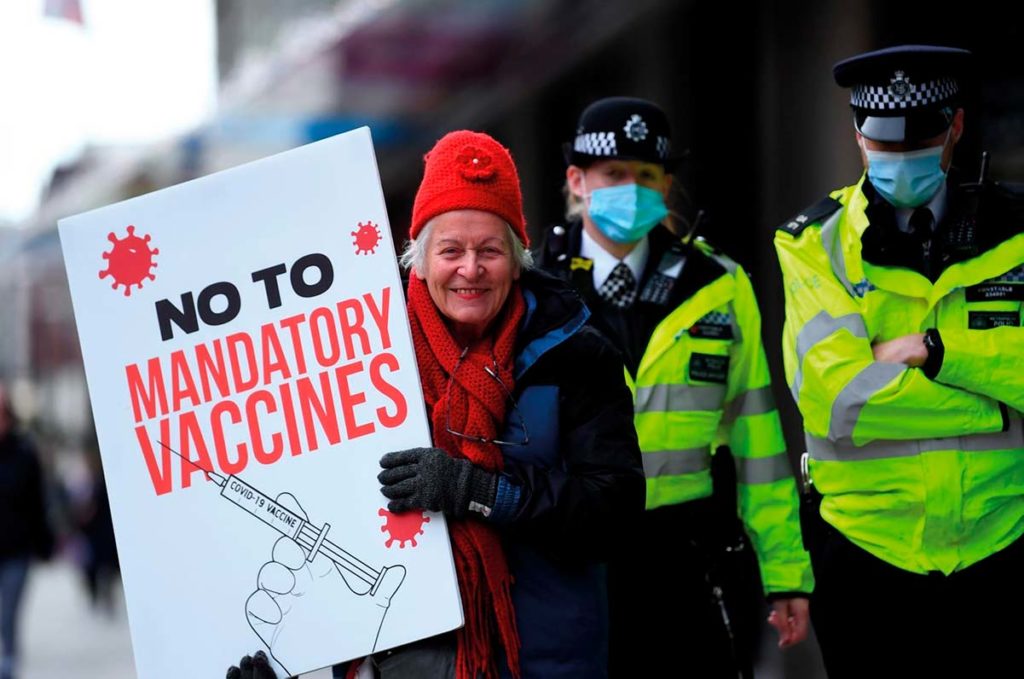Vaccines Minister, Nadhim Zahawi says it would be “remiss” of the government not to consider Covid certification as a way of fully reopening the economy.
Widely dubbed vaccine passports, they could in fact also show if you’ve had a recent test, or you have natural immunity from being infected in the past.
It’s claimed these certificates could help Brits get back to some level of normality when other restrictions ease this summer.
But they are controversial and do raise a number of ethical issues.
It is similar to the “no jab, no job” debate amongst employers. Vaccine coverage is steadily spreading and employers are daring to dream of a fully protected workforce and a return to something near business as usual.
However, despite the obvious benefits of the vaccine, it is not guaranteed that all employees will chose to have one. There are still many people that are unsure about receiving the vaccine.
So, can employers compel staff to be vaccinated? Have the jab or no longer have a job. The answer is not straightforward.
Kelly Sayers, a partner at Keystone Law says “It is easy to see why employers might find the idea of ensuring all workers undergo vaccination appealing. Indeed, a number of high profile employers, particularly in the care sector, have already decided that new starters will be obliged to get the jab. However, these are unchartered waters and culture and ethics aside, it’s an employment law minefield. It raises all sorts of issues around health and safety, data protection, human rights, discrimination and contractual matters. If employers are considering the no jab no job policy they should tread very carefully, taking into account both their own business needs and the particular circumstances of their employees. This is a developing area and employers may initially prefer to stop short of mandatory vaccination policies and instead focus on encouraging and facilitating voluntary vaccination.”
Health and Safety view
Jackie Smith is the Health and Safety Manager for one of our clients, MGS Ltd. She said the following. “The last 12 months have seen all of us facing challenges that most of us in our lifetimes have not experienced before. For health and safety professionals we have had to use our skills to guide employees and businesses to take on new practices and procedures to keep ourselves safe both in work and in our home lives by following Government and Health & Safety Executive guidelines. When all of this began in early 2020 we had no idea of the impact this would have on families, friends and colleagues and the inevitable burden on the NHS. We sadly lost so many to this terrible virus and people’s lives have been changed both in the short and long-term. Fortunately, we have been ahead of the research in the UK and thanks to the fantastic effort of so many scientists, we now have the opportunity to be vaccinated to protect ourselves from becoming seriously ill or the need to be hospitalised. There are some people, who will, unfortunately, not be able to take up the vaccine due to underlying health conditions and it will not work 100% in everyone. Therefore, for those of us who can be vaccinated, it is important we consider taking this option so that our friends, family and colleagues can access the services required immediately if they become seriously ill. Protect yourself and protect those who can’t protect themselves.”
Discrimination Danger
If employers are too heavy-handed about requiring vaccination they risk claims of discrimination under the Equality Act 2010. An employee’s reason for refusing a jab may stem from a medical condition, a disability, from their religion or from a ‘philosophical’ belief. In the last case, an anti-vaxxer would need to show they held a genuine, important, cohesive belief that relates to a ‘weighty and substantial aspect of human life’. Last year, the Employment Tribunal held that ‘ethical veganism’ was capable of protection under the EA. So it is possible in the case of an anti-vaccination stance.
New Starters
Ensuring the current workforce is vaccinated is a potential legal minefield but with new starters it may be easier. When you are offered a role you are not compelled to do that role so there may be more latitude in what the employer can put in the contract.
The type of setting and level of Covid risk will come into play. It will be more difficult to enforce in an office environment where the argument for lawfully making a vaccination a condition of employment is less convincing.
London-based Pimlico Plumbers is one company that has said it will not hire new staff who have refused the vaccination on non-medical grounds. Founder Charlie Mullins said he had been advised it was legal and has said that if people are not happy to sign the new contract that’s their choice, but they won’t be given a job with Pimlico Plumbers.
Covid Certificates
A government review is currently being carried out to see how certificates that show testing status could work in England. They are going to be trialled at upcoming events including the FA Cup final at Wembley Stadium and comedy nights and nightclub events in Liverpool.
No decision has yet been made on whether Covid status certificates will be introduced, but the government has said they could play a role in allowing people to return to theatres, nightclubs and mass events like festivals, and could allow social distancing to be relaxed in hospitality venues.
No jab, no job
As for “no jab, no job”, it remains to be tested by law. In the meantime, employers can strongly urge staff to be vaccinated and signpost them to reliable sources of information about the vaccination but at the same time be mindful of the hesitancy in some people.
Mark Braithwaite, MD at Gipping Occupational Health Ltd says “Given that nearly 32 million people have now had at least one dose and new infection levels are falling, it seems more than a coincidence. The vaccines work and it would seem responsible to take the vaccine when offered it for the benefit of our wider society.”
Josie Beal from Birketts Solicitors made the following comment. “Over the past year employers have had to get to grips with many difficult and unprecedented issues as a result of the COVID-19 pandemic. With the vaccination programme underway, one such issue is whether employers can implement a “no jab, no job” policy and make it mandatory for existing staff members to receive the COVID-19 vaccination. There are clear benefits to seeking to ensure that staff members are vaccinated, namely to protect other staff members (particularly those who may fall into the vulnerable category) and other people employees may come across in the course of their employment. However, this is not something that has been previously tested in UK law and, whilst we hope the vaccine will be effective and certainly the current signs are encouraging, it remains to be seen how it will impact upon the virus in the long run. A blanket requirement for employees to be vaccinated or else risk losing their job is unlikely to be fair, save for a minority of cases (e.g. those who work in healthcare), and even then, it would be important for the employer to carefully consider the situation and seek legal advice before implementing any such policy and particularly before dismissing an employee who chooses not to be vaccinated.





